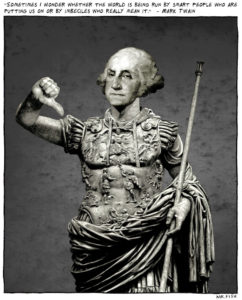Sy Hersh: Military Reeling Over Bush’s Iran Plans
The inestimable Seymour Hersh delivers another can't-miss update on Bush & Co.'s plans to strike Iran. Hersh points out that even more so than about Iraq, we are clueless about Iran's capabilities, and many military planners are seething that the White House is taking Iran's nuclear capabilites for granted. Summarized version of article Full-text versionThe inestimable Seymour Hersh delivers another can’t-miss update on Bush & Co.’s plans to strike Iran. Hersh points out that even more so than about Iraq, we are clueless about Iran’s capabilities, and many military planners are seething that the White House is taking Iran’s nuclear capabilites for granted.
Your support matters…New Yorker:
On May 31st, Secretary of State Condoleezza Rice announced what appeared to be a major change in U.S. foreign policy. The Bush Administration, she said, would be willing to join Russia, China, and its European allies in direct talks with Iran about its nuclear program. There was a condition, however: the negotiations would not begin until, as the President put it in a June 19th speech at the U.S. Merchant Marine Academy, ?the Iranian regime fully and verifiably suspends its uranium enrichment and reprocessing activities.? Iran, which has insisted on its right to enrich uranium, was being asked to concede the main point of the negotiations before they started. The question was whether the Administration expected the Iranians to agree, or was laying the diplomatic groundwork for future military action. In his speech, Bush also talked about ?freedom for the Iranian people,? and he added, ?Iran?s leaders have a clear choice.? There was an unspoken threat: the U.S. Strategic Command, supported by the Air Force, has been drawing up plans, at the President?s direction, for a major bombing campaign in Iran.
Inside the Pentagon, senior commanders have increasingly challenged the President?s plans, according to active-duty and retired officers and officials. The generals and admirals have told the Administration that the bombing campaign will probably not succeed in destroying Iran?s nuclear program. They have also warned that an attack could lead to serious economic, political, and military consequences for the United States.
A crucial issue in the military?s dissent, the officers said, is the fact that American and European intelligence agencies have not found specific evidence of clandestine activities or hidden facilities; the war planners are not sure what to hit. ?The target array in Iran is huge, but it?s amorphous,? a high-ranking general told me. ?The question we face is, When does innocent infrastructure evolve into something nefarious?? The high-ranking general added that the military?s experience in Iraq, where intelligence on weapons of mass destruction was deeply flawed, has affected its approach to Iran. ?We built this big monster with Iraq, and there was nothing there. This is son of Iraq,? he said.
Independent journalism is under threat and overshadowed by heavily funded mainstream media.
You can help level the playing field. Become a member.
Your tax-deductible contribution keeps us digging beneath the headlines to give you thought-provoking, investigative reporting and analysis that unearths what's really happening- without compromise.
Give today to support our courageous, independent journalists.





You need to be a supporter to comment.
There are currently no responses to this article.
Be the first to respond.